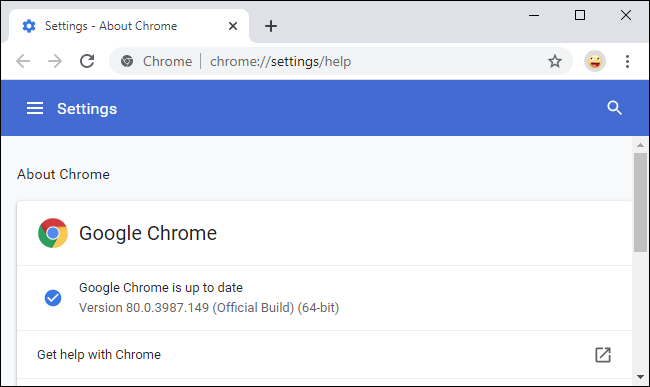Quick Links
Google Chrome automatically updates itself. There's no easy way to turn off automatic updates, but you can do it in several ways---by stopping the Google Update Service that handles automatic updates, for example. Here's why you shouldn't do it.
Chrome's Updates Haven't Been Buggy
Google has a good track record with security updates for Chrome. Google Chrome was originally released in 2008. Now, more than a decade later, it's hard to point to even one example of a catastrophic update bug that caused problems. (Meanwhile, the Windows 10 operating system has had several notable update bugs in the last few years.)
Chrome's updates come and go automatically. Google normally updates Chrome with major new versions every six weeks, and smaller updates that fix security holes and other problems arrive more often than that. Chrome is constantly automatically updating itself and keeping you safe. Most people will almost never notice these updates.
These browser updates aren't inconvenient, either. Unlike Windows Update on Windows 10, Chrome doesn't get in your way by forcing you to restart. Chrome automatically updates itself in the background. If you leave Chrome open for a while, Chrome may ask you to restart your browser when you have a chance, but it won't automatically restart itself and interrupt you.
Google Chrome did once have a data corruption bug on a handful of Macs where people went out of the way to disable System Integrity Protection, which is an important security feature. That's the worst thing that's ever happened, and nothing similar has ever happened on Windows.
Browser Security Holes Are the Real Concern
So, is Chrome perfect? Of course not! Like all web browsers, Chrome is full of bugs you need to worry about. But these aren't update-related problems. They're security holes.
Modern browsers are complex, and security holes are regularly found in them. Google and other browser developers regularly release updates to patch holes found by researchers, or to block new zero-day exploits found in the wild.
Without these regular security patches, you'll end up using a Google Chrome browser that's vulnerable to attack. A malicious website you open in Chrome could potentially compromise your browser and install malware on your PC---just by opening the website.
Security patches protect you from this, and Chrome regularly installs them. Disabling automatic updates prevents Chrome from installing these security patches, putting you at serious risk.
There's no way to get prompted when Chrome updates are available and manually install them. It's automatic updates or nothing.
If You Don't Want Chrome's Automatic Updates
Okay, let's say you really don't want Chrome's automatic updates anyway. For whatever reason, you want to manually approve updates, get fewer big updates, or just remove the Google Updater from your computer.
If this describes you, we recommend switching to another browser. Here are some good alternatives that are more flexible than Chrome:
- To manually approve browser updates, you could switch to Mozilla Firefox. Firefox automatically installs updates by default, but you can choose to have Firefox prompt you when updates are available so you can manually agree to them. In Firefox, head to menu > Options > General. Under "Allow Firefox to," select "Check for updates but let you choose to install them".
- For less frequent new features and interface updates, you could instead pick Mozilla Firefox ESR. The Extended Support Release gets major updates every 42 weeks instead of every 6 weeks, but Mozilla keeps it up-to-date with security updates.
- If you're looking for a Chrome-like browser without using Google's Updater, try the new Microsoft Edge. It's based on the same open-source Chromium code that forms the basis of Chrome, and it's even available for Mac and Linux. Edge automatically updates itself just like Chrome, but it uses Microsoft's updater rather than Google's. Other browsers are based on Chrome, including the Brave Browser. As far as we know, they all use Chrome-style automatic updates to keep people safe.
Whatever browser you choose, be sure to keep it updated with the latest security patches. It's dangerous to keep using an outdated browser full of security holes.



